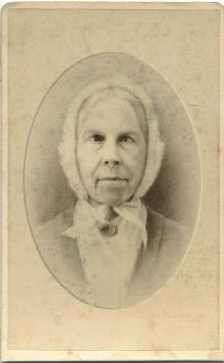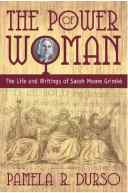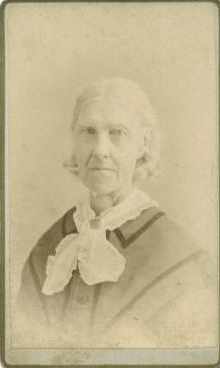Biographies Sarah Moore Grimké und Angelina Emily Grimké

Sarah Moore and Angelina Emily Grimké
Sarah Moore Grimké
born 26 November 1792 in Charleston, South Carolina
died 23 December 1873 in Hyde Park near Boston, Massachusetts
Angelina Emily Grimké
born 20 February 1805 in Charleston, South Carolina
died 26. October 1879 in Hyde Park near Boston, Massachusetts
U.S. abolitionist and feminist activists and writers
Biography • Quotes • Literature & Sources
Biography
Sarah und Angelina Grimké, pioneers in the U.S. anti-slavery movement, were also the first to recognize the connection between women’s oppression and the enslavement of Africans and African Americans in a patriarchal system. Through their writings and activism as public speakers the sisters played a decisive role in the abolitionist movement. They also spurred generations of women to regard themselves as emancipated citizens entitled to equal rights.
 Sarah was the sixth and Angelina the last of 14 children of a highly respected slave-owning family in Charleston, South Carolina. As a girl she already felt an abhorrence of the cruelties of slavery; she taught her personal slave, also a young girl, to read, although this was forbidden by law. This daughter of the upper class was given lessons in drawing, embroidery, French and the harpsichord, but was not permitted to study at university as her brothers were. Hungry for knowledge, Sarah learned as much as she could from her older brother, a student at Yale Law School, in subjects such as Latin, Greek, mathematics, geography. The traditional ideology of the innocent, delicate and helpless woman on a pedestal was especially pronounced in the southern states.
Sarah was the sixth and Angelina the last of 14 children of a highly respected slave-owning family in Charleston, South Carolina. As a girl she already felt an abhorrence of the cruelties of slavery; she taught her personal slave, also a young girl, to read, although this was forbidden by law. This daughter of the upper class was given lessons in drawing, embroidery, French and the harpsichord, but was not permitted to study at university as her brothers were. Hungry for knowledge, Sarah learned as much as she could from her older brother, a student at Yale Law School, in subjects such as Latin, Greek, mathematics, geography. The traditional ideology of the innocent, delicate and helpless woman on a pedestal was especially pronounced in the southern states.
Sarah was not able to liberate herself from her extremely conservative environment until she was 28, after the death of her father; she took the unheard-of step of moving alone to a strange city, Philadelphia. In 1829 her sister Angelina joined her there. At the time the most important city in America, Philadelphia was also the headquarters of the progressive Religious Society of Friends, or Quakers, who guaranteed women equal status in intellectual and spiritual matters. Sarah, who had converted, wanted at first to become a minister.
Even earlier than her sister, Angelina was fully committed to the abolitionist cause. She informed herself about the topic through reading and lectures and asserted in a letter to the radical abolitionist William Lloyd Garrison: “This is a cause worth dying for.” (Yellin 33) When Garrison published the letter without her consent in his paper The Liberator she was sharply criticized by both her family and her Quaker community, but refused to retract her words.
 Instead she wrote the pamphlet An Appeal to the Christian Women of the South (1836), in which she called on the women of slaveholding states to protest against the unchristian system. This treatise by the daughter of a respected southern family – the most important statement by a female abolitionist prior to the Civil War – resulted in her being banned from the city of Charleston and alienated from family, friends and the Quaker community. Undaunted, the courageous young woman, now an active member of the American Women Against Slavery, followed her path without wavering; as a manifesto for the organization’s 1837 meeting she composed a call to the women in the “so-called free states” to recognize their own shared responsibility for the slave system and join the struggle against it.
Instead she wrote the pamphlet An Appeal to the Christian Women of the South (1836), in which she called on the women of slaveholding states to protest against the unchristian system. This treatise by the daughter of a respected southern family – the most important statement by a female abolitionist prior to the Civil War – resulted in her being banned from the city of Charleston and alienated from family, friends and the Quaker community. Undaunted, the courageous young woman, now an active member of the American Women Against Slavery, followed her path without wavering; as a manifesto for the organization’s 1837 meeting she composed a call to the women in the “so-called free states” to recognize their own shared responsibility for the slave system and join the struggle against it.
Sarah Grimké eventually left the Society of Friends because it discriminated against Blacks and maintained a luke-warm position concerning abolition of slavery. She and Angelina began to write and speak out against slavery in New England. At first they addressed small private groups of women, but soon were describing their first-hand knowledge of the brutal slave system in front of large “mixed” audiences. In one year alone they spoke in 88 gatherings to more than 40,000 people. Angelina especially was a gifted orator, who moved and inspired her listeners. But as women Sarah and Angelina had to fight for their right even to have a political opinion of their own and above all to express it publicly to a mixed audience rather than an intimate female sewing circle. Angelina, the more (in)famous of the two, was castigated as unfeminine, morally depraved and demonic, and called “Devilina.”
In the face of the growing enthusiasm and activism among New England women as a result of the Grimké sisters’ ideas, the male clerical elite felt threatened and criticized them in a Pastoral Letter in 1837. As an answer to this harsh and widely circulated document – it was read from the pulpit of every Congregational church – Sarah composed her pioneering Letters on the Equality of the Sexes and the Condition of Woman (1838), in which she anticipated today’s women’s movement by completely demolishing the Biblical arguments used by the ministers to keep women in a subordinate position. Later feminists, from Lucy Stone to Lucretia Mott and Elizabeth Cady Stanton, repeatedly refer to Sarah’s letters in their own analyses.
 In her public letters to the conservative Catherine Beecher (1837) Angelina too had dealt with this topic, drawing the connection between the oppression of slaves and of women: “The investigation of the rights of the slave has led me to a better understanding of my own.” She called for women to have the rights to help write the laws under which they lived and to sit in the seats of government. A high point in Angelina’s career as an orator came in 1837 when she became the first woman in the U.S. to address a legislative body by presenting a petition against slavery, signed by 20,000 women, to the Massachusetts legislature.
In her public letters to the conservative Catherine Beecher (1837) Angelina too had dealt with this topic, drawing the connection between the oppression of slaves and of women: “The investigation of the rights of the slave has led me to a better understanding of my own.” She called for women to have the rights to help write the laws under which they lived and to sit in the seats of government. A high point in Angelina’s career as an orator came in 1837 when she became the first woman in the U.S. to address a legislative body by presenting a petition against slavery, signed by 20,000 women, to the Massachusetts legislature.
After Angelina’s marriage to fellow ablitionist Theodore Weld the two sisters gradually withdrew from public life. They founded a progressive school in New Jersey and continued their innovative educational work after they moved to Hyde Park, outside of Boston, Massachusetts. Even in their old age Sarah and Angelina demonstrated their commitment to women’s rights as they marched through a snowstorm in 1870 to try to cast their ballots and thus present a legal challenge to the male-only voting privilege.
Author: Joey Horsley
Quotes
I believe it is the woman's right to have a voice in all the laws and regulations by which she is to be governed, whether in Church or State: and that the present arrangements of society, on these points, are a violation of human rights, a rank usurpation of power, a violent seizure and confiscation of what is sacredly and inalienably hers. (Angelina Grimké, Letters to Catharine Beecher, 1837)
Men and women were CREATED EQUAL…. Whatever is right for a man to do, is right for woman….I seek no favors for my sex. I surrender not our claim to equality. All I ask of our brethren is, that they will take their feet from off our necks and permit us to stand upright on that ground which God destined us to occupy. (Sarah Grimké, Letters on the Equality of the Sexes and the Condition of Woman, 1838)
To be married is too often held up to the view of girls as the sine qua non of human happiness and human existence. For this purpose more than for any other … the majority of girls are trained…. This mode of training teaches women to regard themselves as a kind of machinery, necessary to keep the domestic engine in order. (Sarah Grimké, Letters on the Equality of the Sexes and the Condition of Woman, 1838)
Literature & Sources
Durso, Pamela R. 2004. The Power of Woman: The Life and Writings of Sarah Moore Grimké. Macon, GA. Mercer UP.
 Grimké, Angelina Emily. 2003. Walking by faith: The Diary of Angelina Grimké, 1828-1835. Hg. Charles Wilbanks. Columbia, SC. University of South Carolina Press.
Grimké, Angelina Emily. 2003. Walking by faith: The Diary of Angelina Grimké, 1828-1835. Hg. Charles Wilbanks. Columbia, SC. University of South Carolina Press.
Grimké, Angelina Weld. 1991. Selected Works of Angelina Weld Grimké. Hg. Carolivia Herron. New York, NY. Oxford UP.
Lerner, Gerda. 2004 (1967). The Grimké Sisters from South Carolina: Rebels Against Slavery. Revised and enlarged edition. University of North Carolina Press.
 Lerner, Gerda. 1998. The Feminist Thought of Sarah Grimké. Oxford. Oxford UP.
Lerner, Gerda. 1998. The Feminist Thought of Sarah Grimké. Oxford. Oxford UP.
Nies, Judith. 2002 (1977). Nine Women: Portraits from the American Radical Tradition. Berkeley, CA. University of California Press.
Perry, Mark 2003. Lift Up Thy Voice: The Grimke Family's Journey from Slaveholders to Civil Rights Leaders. New York. Penguin.
Sarah Grimké, Angelina Grimké. 1996. Gale Free Resources. Women’s History.
 Spender, Dale. 1982. Women of Ideas (and What Men Have Done to Them): From Aphra Behn to Adrienne Rich. London; Boston; Melbourne. Ark PB. S.215-230.
Spender, Dale. 1982. Women of Ideas (and What Men Have Done to Them): From Aphra Behn to Adrienne Rich. London; Boston; Melbourne. Ark PB. S.215-230.
Todras, Ellen H. 1999. Angelina Grimké: Voice of Abolition. North Haven, CN. Linnet.
Yellin, Jean Fagan. 1989. Women and Sisters: The Antislavery Feminists in American Culture. New Haven; London. Yale UP.
If you hold the rights to one or more of the images on this page and object to its/their appearance here, please contact Fembio.



